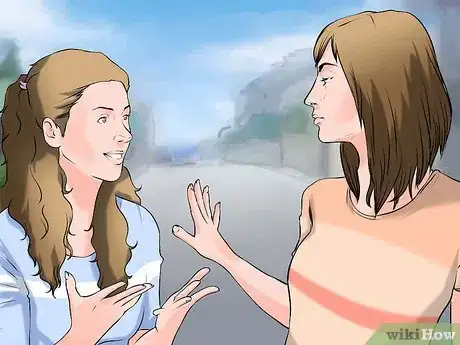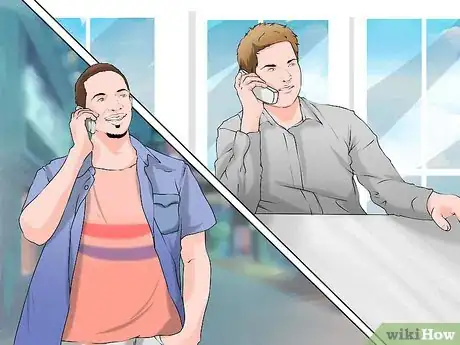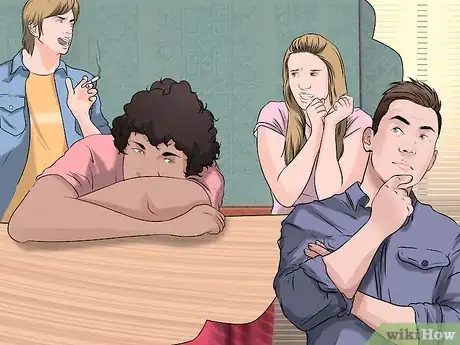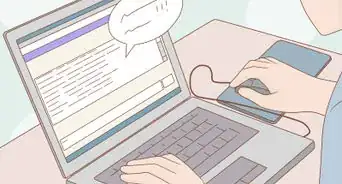This article was co-authored by Sabrina Grover, LMSW. Sabrina Grover, LMSW is a Licensed Master Social Worker (LMSW) who earned her degree in Advanced Clinical Practice from New York University. Sabrina has experience working in substance abuse recovery centers and schools where she gained experience providing evidence-based treatment to children, adolescents, adults, and families. Sabrina specializes in Dialectical, Narrative, and Cognitive Behavioral Therapies. She has particular expertise in treating clients struggling with grief, complex trauma, interpersonal difficulty, family conflict, anxiety, and depression. She commits to providing a supportive environment for everyone who commits to growth and offering a warm, non-judgmental atmosphere.
There are 8 references cited in this article, which can be found at the bottom of the page.
This article has been viewed 124,988 times.
We all enjoy being around positive people who like us and make us feel good. However, sometimes we surround ourselves with people who just don’t seem to like us, no matter how hard we try. Interacting with people that dislike you can be toxic and bring a lot of negativity of your life. Cutting these people out of your life can be hard but do wonders for making you happier.
Steps
Recognizing Negativity
-
1Focus on how they make you feel. It can be tough to recognize when someone is toxic and not in your best interest, especially if it’s someone you’ve known a while. One sure sign of a toxic, negative person is listening to your gut and how they make you feel.
- You may dread being around them and exhibit signs of nervousness anticipating meetings like sweat palms, nausea and a general uneasy feeling.
- Toxic, negative people tend to exude pessimism and can even be physically or verbally abusive. If you find any of these traits in your relationship with a family member or friend, you may need to evaluate the relationship.
-
2Observe their other relationships. People who are negative and toxic tend to have one-sided relationships. Sometimes it can be hard to be an observer of your own relationship. Watch how they interact with their other friends, particularly whether they talk negatively about other people. Those who feel the need to bring others down may do the same to you.[1]
- They always worry about themselves. Whether you’re telling them about your day or your own feelings, toxic people will turn the focus to themselves. They also tend to be greedy and more concerned with their wellbeing than yours.
Advertisement -
3Realize you need a change. When you realize that someone dislikes you and you’d be better off without his or her negativity, make a change for your own good. This important step means you’re ready to seek positive change in your life and surround yourself with people of similar goals.[2]
- Focus on your own strengths and positive attributes, and put your energy into navigating the world in a positive way.
Getting Rid of Toxic Friends
-
1Remove yourself from the situation. If you’ve decided that the relationship cannot be salvaged, you’ll need to find ways to distance yourself from them.
- If they’re a co-worker or classmate, try to adjust your schedule to avoid one another. Alternatively, talk to a superior and have them help you avoid being around one another as much as possible.
-
2Find another group of friends. It can be hard, but if you’re constantly coming across someone who dislikes you through a mutual group of friends, you might want to either find a new group to hang around or tell your friends your problem.[3]
- If you have great friends in that group, talk to them and let them know how you feel about the person in question. They may have noticed it too. If they are good friends, they will help you avoid something that's making you uncomfortable.
- Look for people that don't have the same patterns or negativity as the people you're removing from your life.
-
3Surround yourself with positivity. One way to weed out that bad is to surround it with good. If you put people around that are positive and make your situation positive.[4]
- If you have positive friends that you enjoy being around, try to make plans with them that don't include your negative friend.
-
4Establish boundaries. Talking might be helpful, but where this fails you need to act in a way that is best for your own well being. This might include avoiding their conversations, avoiding being at the same place as them or even just generally drawing a line to avoid them at all costs.[5]
- If it's a co-worker, make a boundary that eliminates any talk or activities not revolving around work. The person will quickly get the hint and keep your relationship professional.
-
5Learn to say no. If you’re trying to cut a negative relationship, remember that friendships are mutually consensual relationships. In other words, if you do not find yourself in a friendship that helps you, don’t be afraid to put your foot down. When all other means have failed, and your negative friend still persists; simply tell them no and avoid social interactions.
- This can be hard but you should never feel obligated to see and speak to people who cause negativity in your life. Once you have said no enough times, they'll likely get the hint.
Dealing with Toxic Family
-
1Be open and communicate. Whereas friendships come and go, things become more complicated when it’s your family member. If it's a family member, you’ll want to make an attempt to talk about your relationship and what bothers you. This will make them aware that what they’re doing upsets you.[6]
- If they something hateful toward you, it may be because something negative going on in their life. Clearing it up may help.
-
2Get help. This depends on who the family member is and how meaningful their relationship is to you. If it is your parent, sibling or even a spouse, you may opt for an outsider’s opinion and attend therapy.[7]
- Depending on the relationship there are a variety of ways to seek help such a family counselors, social workers, or other professionals that help relationships.
-
3Limit your interactions. If you have a family member that is toxic, it might be best that you only interact with them during obligatory get-togethers like holidays and celebrations.
- If your family member tries to see you more often, don’t be afraid to say no. You don't have to confront them about your relationship, but avoidance can help weed out the negativity from your life.
-
4Stand up for yourself. Although it can be hard to cut out a negative family member, you should not let their behavior go without comment. This will not only prevent them from changing, but more importantly it will allow the negativity to remain in your life.[8]
- Tell them what they’re doing bothers you. It may not make the problem go away, but at least you’re standing up for yourself. Recall their previous behavior so that you can give them specific examples.
-
5Prepare to cut them out. No one wants to lose a relationship with a family member but if they cannot heed your warnings that they hurt you, you have to worry about yourself first. If your family member has given no indication that they’ll change you should not let yourself be bogged down by them until they can work their own problems out.
- If it comes to this, don't be afraid to give them an ultimatum that let's them know their behavior is giving you no choice. That way if they persist, they'll at least know why.
Community Q&A
-
QuestionWhat if they force me to hang out with them?
 Community AnswerSay no! If they actually force you, that is harassment and you should immediately contact a trusted parent, teacher, boss or friend. Being forced to do something you don't want to do is 100% unacceptable.
Community AnswerSay no! If they actually force you, that is harassment and you should immediately contact a trusted parent, teacher, boss or friend. Being forced to do something you don't want to do is 100% unacceptable. -
QuestionHow do I make people stop arguing with me in high school?
 Community AnswerTell them you don't like arguing, and try to drop the subject and move on to something else.
Community AnswerTell them you don't like arguing, and try to drop the subject and move on to something else. -
QuestionWhat if someone sent me an anonymous message calling me ugly?
 Community AnswerYou should just ignore them. If they're too much of a coward to let you know who sent the message, then does their opinion really matter?
Community AnswerYou should just ignore them. If they're too much of a coward to let you know who sent the message, then does their opinion really matter?
References
- ↑ http://www.webmd.com/women/features/toxic-friends-less-friend-more-foe
- ↑ http://www.jamesaltucher.com/2011/06/how-to-deal-with-crappy-people/
- ↑ http://www.rappler.com/move-ph/29565-mend-or-end-how-to-deal-with-a-toxic-friend
- ↑ http://www.businessinsider.com/signs-your-coworkers-secretly-hate-you-2015-9
- ↑ http://www.marcandangel.com/2013/12/08/7-smart-ways-to-deal-with-toxic-people/
- ↑ https://www.psychologytoday.com/us/blog/in-flux/201802/7-strategies-deal-difficult-family-members
- ↑ http://www.elephantjournal.com/2012/05/12-ways-to-deal-with-a-toxic-familyfamily-member/
- ↑ http://www.ilanelanzen.com/familyandparenting/10-signs-you-have-toxic-family-members-and-3-things-you-can-do-about-it/












































































